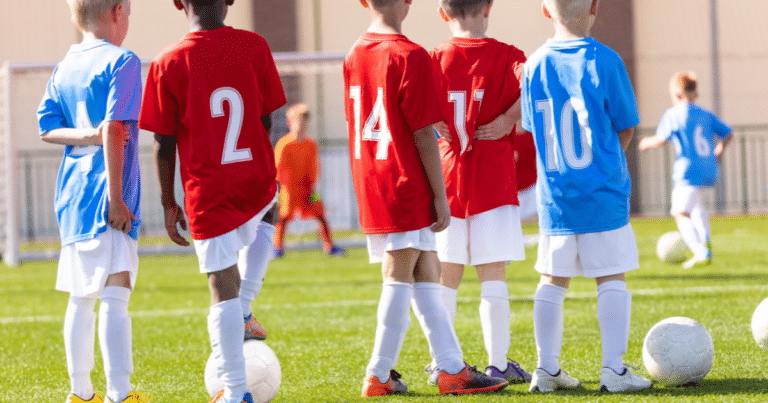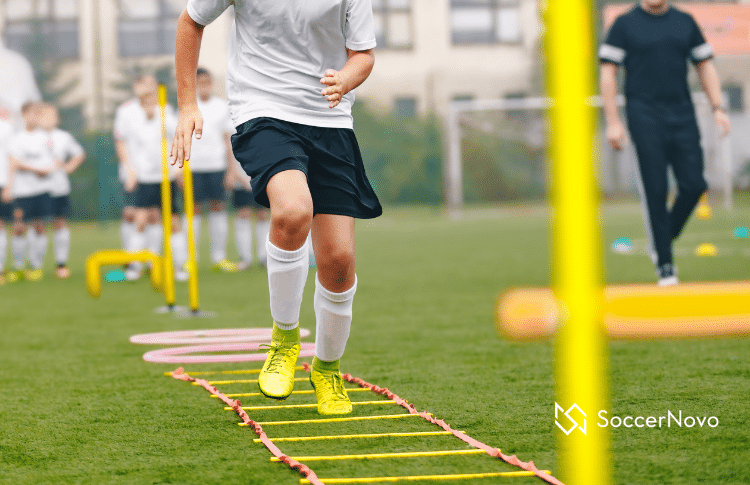Can I Play Soccer When I’m Sick? Parenting Advice

If you’ve come across this article then you are probably under the weather or have a child that is not feeling well. You might be wondering if they should play in a soccer game or not.
The answer to whether or not you should play soccer when you’re sick is not a simple one, as it depends on a variety of factors.
First and foremost, it’s important to consider the type of illness you’re dealing with. If you have a minor cold or a headache, you may be able to play soccer without any issues.

However, if you have a more serious illness, such as the flu or a fever, it’s best to avoid playing soccer until you’ve recovered.
From a parenting perspective, let’s take a deeper look at the impact an illness can have on a player and whether it is okay to play soccer.
The Impact of Illness on Physical Performance
When you’re sick, it’s important to take care of your body and avoid activities that could make your condition worse.
While playing soccer may seem like a fun way to get some exercise and fresh air, it’s important to consider the impact of illness on your physical performance before lacing up your cleats.
Effects on Stamina and Endurance
When you’re sick, your body is working hard to fight off infection and recover. This means that your energy levels may be lower than usual, and you may experience fatigue more quickly than you would normally. This can have a significant impact on your ability to play soccer, as the game requires a lot of running, jumping, and other physically taxing movements.
In addition, illnesses like the flu or a cold can cause muscle aches and weakness, making it even more difficult to maintain your stamina and endurance on the field.
If you’re feeling particularly weak or tired, it’s best to rest and allow your body to recover before attempting any strenuous physical activity.
Influence on Focus
In addition to physical symptoms, illnesses can also affect your mental state and cognitive abilities. When you’re sick, you may find it more difficult to concentrate or stay focused on the game. This can impact your coordination and ability to make quick decisions on the field, which are essential for playing soccer effectively.
Some illnesses can cause dizziness or lightheadedness, which can further impact your coordination and balance. If you’re experiencing these symptoms, it’s best to avoid playing soccer until you’re feeling better and can perform at your best.
When you’re feeling lethargic and/or dizzy, you are not only affected by the symptoms but your team will be too. Not matter how good of a player you are, not feeling well can sometimes bring the entire team down. In this case, it’s better to take a game or two off. There will be plenty of games ahead!
Common Illnesses and Their Effects on Soccer Playing
Here are some common illnesses and their effects on soccer playing:
Respiratory Illnesses
Respiratory illnesses such as the common cold, flu, and asthma can affect your breathing and stamina, making it difficult to perform at your best.
Symptoms of respiratory illnesses may include coughing, wheezing, shortness of breath, and chest congestion. This can sometimes feel like you are breathing through a straw. No bueno.
If you have a respiratory illness, you can sometimes play but will be limited. Keep in mind that playing soccer when you have a respiratory illness may worsen your symptoms and prolong your recovery time.
Gastrointestinal Illnesses
Gastrointestinal illnesses such as stomach flu, food poisoning, and diarrhea can cause dehydration and weakness, making it challenging to maintain your energy levels during soccer games.
Symptoms of gastrointestinal illnesses may include nausea, vomiting, diarrhea, and stomach cramps.
If you have a gastrointestinal illness, it is best to avoid playing soccer until you have fully recovered.
Chronic Illnesses
Chronic illnesses such as diabetes, heart disease, and arthritis can affect your overall health and well-being, making it challenging to perform at your best during soccer games.
If you have a chronic illness, it is essential to work with your doctor to manage your symptoms and maintain your health. You should also consider talking to your coach about any accommodations you may need to play soccer safely and effectively.
When Not to Play Soccer When a Player is Sick
Sometimes, players may feel like they can play even when they are under the weather. Here are some things to consider.
High Fever and Soccer
If you have a high fever, it’s best to avoid playing soccer until your fever has gone down. A fever is a sign that your body is fighting an infection, and playing soccer can put additional stress on your body. This can make it harder for your body to fight off the infection and can also increase your risk of dehydration.
If you have a fever, it’s important to rest and stay hydrated. You can take over-the-counter medications like acetaminophen or ibuprofen to help reduce your fever and manage any pain or discomfort you may have.
Infectious Diseases and Soccer
If you have an infectious disease, it’s important to avoid playing soccer until you have recovered. Infectious diseases like the flu, strep throat, or mono can spread easily from person to person, especially when you’re playing a contact sport like soccer.
If you have an infectious disease, it’s important to stay home and avoid contact with others until you have recovered. This can help prevent the spread of the disease to others and also help you recover more quickly.
Recovery and Return to Soccer
If you have been sick, it is important to allow your body to fully recover before returning to soccer. Here are some tips to help you recover and return to the field safely.
Rest and Hydration
Rest is crucial to allow your body to fight off the illness. Make sure you get plenty of sleep and avoid any strenuous physical activity until your symptoms have completely disappeared.

Additionally, staying hydrated is important to help your body recover. Drink plenty of water and avoid sugary or caffeinated beverages.
This is timeless advice passed down from your Grandparent’s Grandparents so don’t take it lightly…it works!
Gradual Return to Physical Activity
Once you are feeling better, it is important to gradually return to physical activity. Start with light exercises, such as stretching or walking, and gradually increase the intensity of your workouts. Listen to your body and do not push yourself too hard too quickly.
It is also important to consider the type of illness you had. If you had a respiratory illness, such as a cold or flu, it may take longer for your body to fully recover. In this case, it is important to consult with your doctor before returning to soccer.
Take the time to fully recover and gradually return to physical activity to ensure a safe and successful return to the field.
Can I Play Soccer with a Cold?
When you have a cold, it is not uncommon to wonder if you should play soccer or any other physical activity. I think it’s fine to play but these things may happen.
- Decreased Performance: When you have a cold, your body is already working hard to fight off the virus. This means that your energy levels are likely to be lower than normal, and your overall performance on the field may suffer.
- Risk of Injury: When you are sick, your body is weaker and more vulnerable to injury. Playing soccer with a cold can increase your risk of getting hurt, especially if you are not feeling 100%.
- Contagiousness: If you have a cold, you are contagious and can spread the virus to others. Playing soccer with a cold can put your teammates and opponents at risk of getting sick as well.
If you do decide to play soccer with a cold, it is important to take extra precautions to protect yourself and others. Here are a few tips:
- Stay Hydrated: Drinking plenty of fluids can help keep your body hydrated and may help alleviate some cold symptoms.
- Rest When Needed: If you start feeling tired or weak during the game, take a break and rest for a few minutes.
- Cover Your Mouth: Coughing and sneezing can spread germs to others. Cover your mouth with a tissue or your elbow to help prevent the spread of the virus.
Conclusion
Parents should have the final say whether a player plays or sits out because of an illness.
I know as a player, I would want to play when I was sick but this wasn’t always the smartest decision. Rest and recovery are very important when a child is sick.
If you have a mild illness, such as a common cold, it may be possible to play soccer, but it’s important to listen to your body and not push yourself too hard. Be sure to stay hydrated and take breaks as needed.
However, if you have a more serious illness, such as the flu or a fever, it’s best to avoid playing soccer altogether. Rest and recovery should be your top priority in order to avoid further complications.
Just keep in mind, that there are probably a lot more soccer games in a child’s future. Missing a couple of them won’t set them back. In fact, it’s best that they are feeling their best for themselves and their team!

Written By: SoccerNovo
SoccerNovo is an independent youth soccer media brand built to help parents, players, and coaches better understand the game and the pathways available in U.S. soccer. Our mission is to make youth soccer simpler, clearer, and more accessible for everyone involved in it.
Let’s connect





